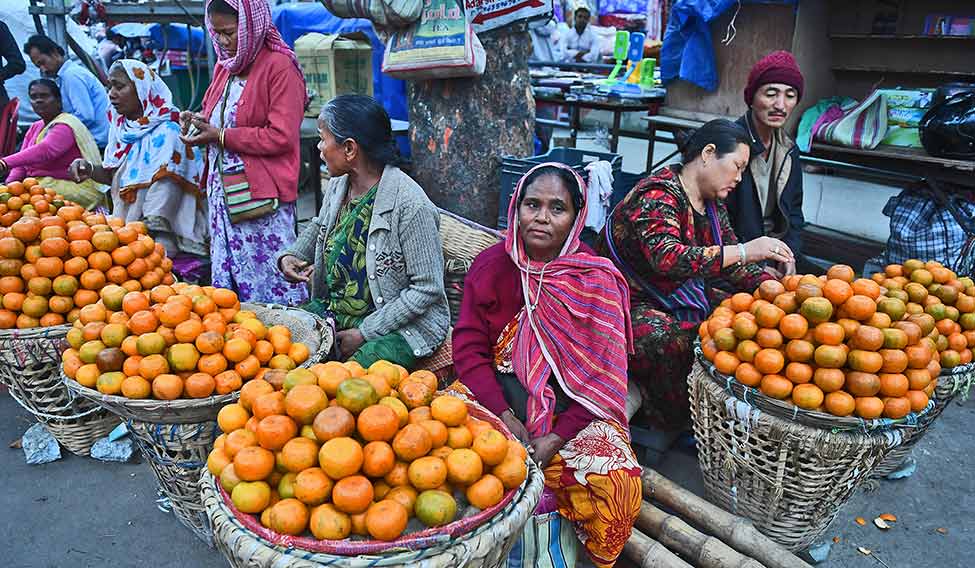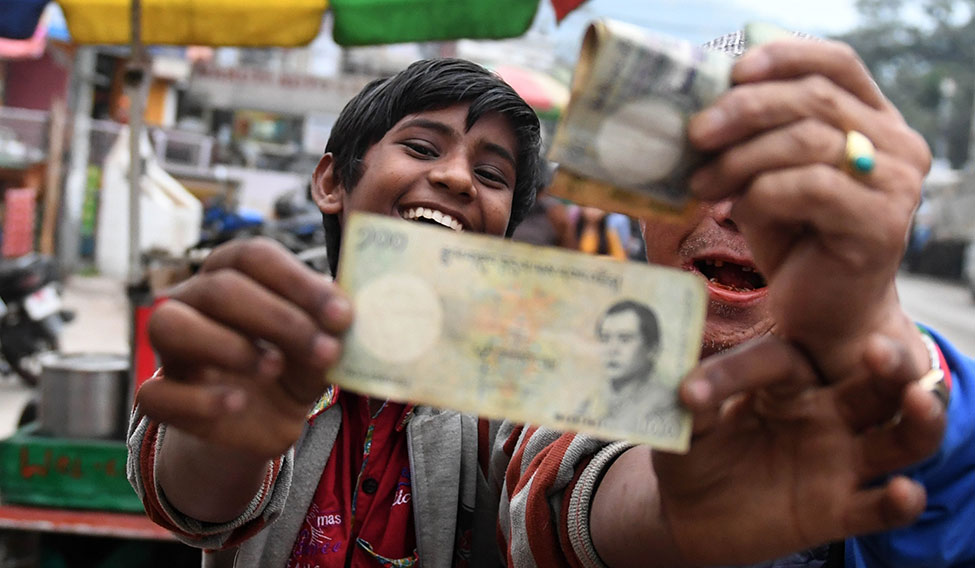A tribe of monkeys guarded the path leading to the Trihana Tea Garden in north Bengal, about 20km from the India-Nepal border. As we approached, they reluctantly gave way and allowed us to reach the closed gate. A gentle knock elicited a response from the other side. “The garden is closed, no need to come,” said a middle-aged man. As we persisted, he let us in. The once famous tea garden looked deserted and a lonely notice board displayed a bunch of letters from the manager. The latest one read: “Due to demonetisation, we are unable to help workers and plucking will be closed for an indefinite period.”
“Only I have been asked to stand at the gate and will be paid for it,” said the gatekeeper, Mohan Roy. “All of my colleagues [about 450] have lost their daily earnings from December 12.”
Another notice, dated December 3, instructed the employees to open bank accounts under the Union government’s Jan Dhan scheme, to minimise cash transaction and avoid disruption of payment.
But, it was apparently too late for the workers to do so and, in dire need of money, they protested outside the manager’s office on December 8. Under mounting pressure, the garden was shut down.
About half a dozen other tea gardens have also shut down as the owners couldn’t pay cash to the workers. “Yes, the gardens are closed,” said Rabindranath Ghosh, minister of north Bengal development. “We could do little. The entire country is facing problems because of such a policy. What could we do?”
While the tea gardens in north Bengal face the brunt of demonetisation, thousands of villagers along the Indian border in the state have created their own economic rules. They have started using currency from Nepal and Bhutan, along with the Indian rupee, for daily transactions.
Apparently, this is quite common in the villages of Darjeeling, Jalpaiguri and Alipurduar districts. Unofficial estimates are that about eight lakh people in these districts use Bhutanese and Nepalese currency. Apparently, people coming in from these countries, with their own currency, don’t convert it into Indian rupee but use it for transactions. The Indians accept the notes, especially denominations of 100 and 500, as those are in short supply in India. The West Bengal government has admitted that such a trend is not new, but that no action has been taken. “In the recent past, it had reduced a bit,” said Ghosh. “But, after demonetisation, it is again flourishing.”
While the official value of Bhutan’s ngultrum is same as the Indian rupee, its value at the border has reduced by about 40 per cent after demonetisation and with the high demand for Indian money. There have been similar fluctuations at the Nepal border, too.
 No fruits of labour: Small vendors have had a tough time dealing with demonetisation | Salil Bera
No fruits of labour: Small vendors have had a tough time dealing with demonetisation | Salil Bera
THE WEEK travelled to some of these places to assess the situation. At Jaigaon, a bustling town close to the Bhutan border, electronics and stationery seller Rambabu Jaiswal said half his daily earnings were in Bhutanese currency. But, what does he do with the foreign currency? “At the end of the month, I go to Bhutan with ngultrum and buy rice, dal and other food,” he said. “If I have excess Bhutanese currency after that, I go to a Bhutan currency dealer or bank, which gives me Indian currency.”
Rita Devi, who sells metal statues and utensils at a nearby mall, said that though demonetisation had affected her business, she was “saved” by the incoming currency. “The scarcity of Rs 100 notes has been met by the Bhutanese and Nepali currency notes,” she said.
Demonetisation has also affected business in Bhutan, whose economy relies heavily on India. “This year, the pilgrimage to Bodh Gaya from Bhutan is having a dry run as we could not get Indian currency,” said Singe Wangchuk, administrative chief of a hotel in Phuntsholing, Bhutan. “Our currency would not work beyond this border area. No travel agency is making money this year. Also, our hotel industry is suffering a lot.”
Dipankar Dasgupta, an economist and former adviser to Chief Minister Mamata Banerjee, said the illegal circulation of foreign currency would result in an infusion of black money into India. “What is happening in the border areas of West Bengal is surprising and I am hearing about it for the first time,” he told THE WEEK. “With extra liquidity in the market illegally, business would rise. But, goods [here] are not made locally and come from other areas [which leads to the money going to those centres]. It would, therefore, lead to a sharp price rise in these areas. These [foreign notes] should be treated as fake currencies and this is same as black money. Any money in circulation unofficially is black.”
When warned of possible action against them, the traders said they would not be able to do business and would have to leave the place. Said Rajkumar Jaiswal, a stationery trader in Jaigaon: “During this currency crisis, we only use Bhutanese notes. We send all of them to our wholesalers, who accumulate them and send that back to Bhutan. Money is deposited in his account from Bhutan.”
Similarly, Nepalese currency is helping businesses survive along the India-Nepal border. Traders admit that they exchange Nepalese notes to beat demonetisation. “Initially, we waited for some days. But when my sale dropped from Rs 10,000 a day to Rs 4,000, we started mixing Nepalese and Indian currency,” said Prabhash Ghosh, who has a cosmetics shop in Panitanki, near the border.
The illegal trading in the border villages seems to have adversely affected Nepal. When we crossed the Nepal border and reached Kakarvitta town, we found a lot of casinos were deserted. As casinos in Nepal do not allow locals to enter, their main clientele was Indians, who have stopped visiting because of demonetisation.
The West Bengal government, however, says it cannot act against the illegal trading. “The people are doing this out of necessity. Can we arrest them? Never,” said Ghosh. “The Central government has not taken any action regarding this. However, we would not be able to support any penal action against these people as well. They are innocent.”








